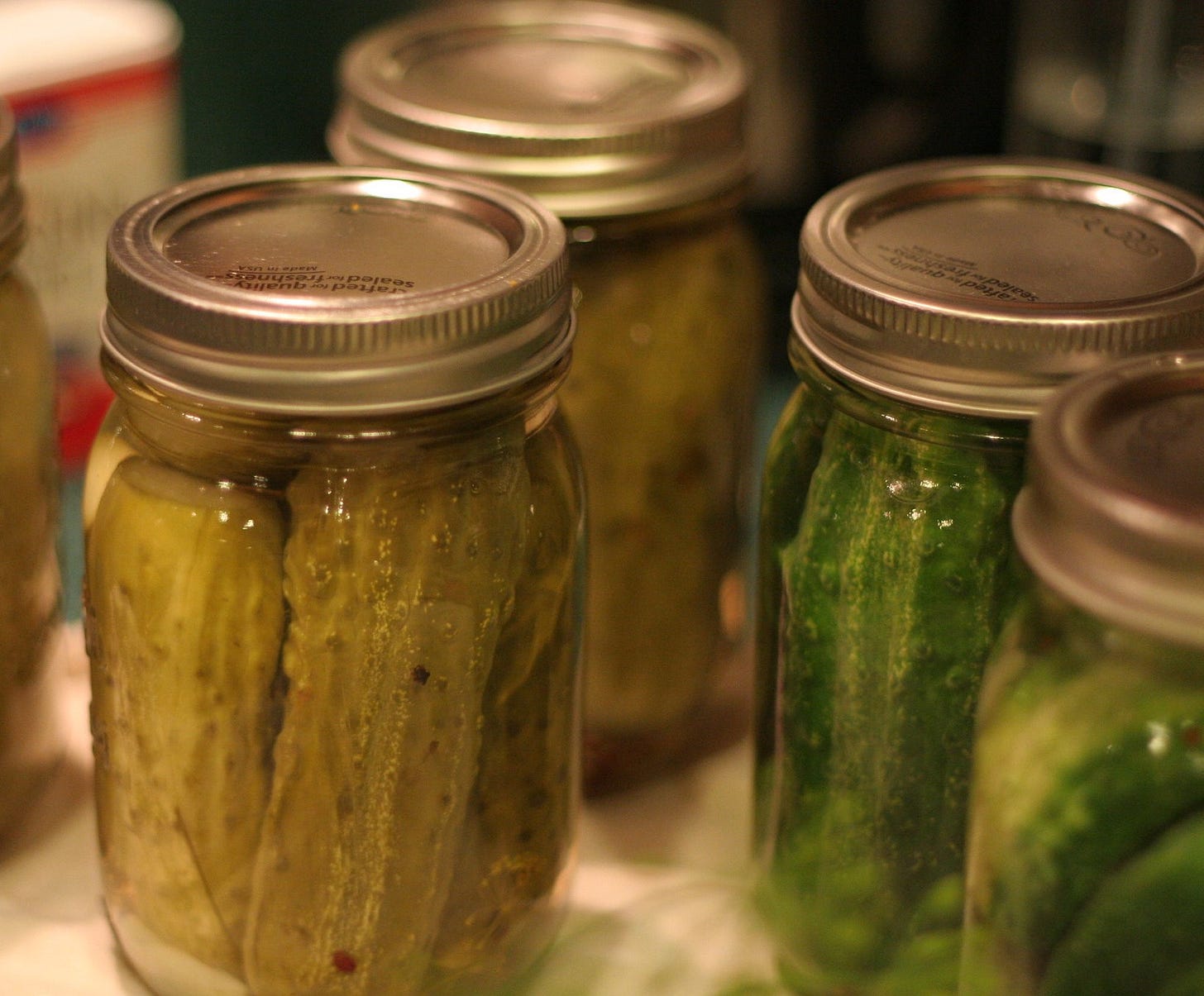Little Pickles
In high school, I worked at a submarine sandwich shack called The LiL’ Pickle (I kid you not). That wasn’t my first job, but it was the first to come with a weekly paycheck. Before then, I’d earned a penny per pulled weed; a fifty-cent piece per lost tooth; and dollar bills for babysitting, housecleaning, or addressing hundreds of envelopes in my legible script to announce a furniture store’s liquidation sale. But receiving an official paper check in the 1970s, no matter how small an amount, was a teenage rite of passage. In Southern California, it also meant a trip to Home Savings and Loan—a banking institution known for remarkable beauty (not kidding) before it succumbed to a savings and loan debacle. Have a listen to this Smithsonian Institute oral history interview. And search for Adam Arenson’s book, Banking on Beauty: Millard Sheets and Midcentury Commercial Architecture in California to see photos of the amazing mosaics found at these financial institutions.
Kosher Pickles
My Grandma Rose (b. 1896) included homemade dill pickle instructions in her handwritten recipe book, a small 6-ring notebook stuffed with ideas for blintzes, cakes, casseroles, and Passover seders. She mimeographed copies for each of her three sons. My dad later typed the contents and (probably when he worked for Xerox!) photocopied the pages to create 8x5” spiral bound cookbooks for each of his three children.
By then, he had mastered the art of dill pickle making, thanks to aerospace industry layoffs. While unemployed for many months, he took on numerous projects. One day, while we kids were at school, he searched local antique stores until he found a large, ceramic pickle crock.
“Oh, are you going to make a lamp out of it?” said the clerk.
“No,” Dad said, “I’m going to make pickles.”
Then he bought knobby cucumbers and used Grandma’s recipe, as follows:
Dill Pickles Small pickles, soak overnight* in salt water. Fill 1 quart jars with pickles, add 2 cloves galic cup up, 1 heaping tbsp pickling spices, 2 red peppers, 2 small sprigs of fresh dill. Brine 1 c. coarse salt 1 cup cider vinegar 6 quarts water Mix together and pour over jars or crock of pickles. Let stand 2 weeks. *I think I remember seeing a bathtub full of pickles soaking in saltwater, but maybe I’m imagining it. Childhood memories are tricky.
In A Pickle
As a memoir writer with a nearly finished manuscript, I find myself in an ongoing game of pickle, running back and forth keeping my eye on the ball as it arcs overhead from glove to glove—never tagged out, never called safe—working to round the bases.
The twenty-year span at the heart of the memoir includes background from my Jewish childhood and teenage evangelical Christian conversion; the fifteen months I lived on the Navajo Nation as a young mom married to a missionary; the seven years we spent in Native American campus ministry in Arizona; and the subsequent years as a divorced, non-religious mom working toward a PhD.
How much should I worry about whom I may offend by talking about my life?
When you first start writing a personal essay or memoir, you’re advised to “just write”: Vomit it all out on the page, don’t censor yourself, don’t worry about what you say or how you say it—it’s all private in the early stage.
Good advice, at first. After all, no one says you have to publish what you write.
After a while (hours to years), you start thinking about your reader. And you write with awareness because you want to engage each reader’s imagination and emotions. And you realize that the ideal reader you’ve envisioned is not your only reader.
As I finish writing and approach querying (asking literary agents to consider representing my book to publishers), I find myself in this in-between place. A place between what I want to say about my lived experience and how the reader (you, others) will respond, react. I live and write with that tension and awareness. And I keep writing.
I must have faith in my ability to navigate this uncertain terrain, this game of pickle. And then I realize that’s what the memoir is about! All those years of learning how to live in that liminal place between expectation and reality—between what I was told and what actually happened; what I wanted and what I couldn’t achieve; what I believed and what turned out to be true.
None of us are born knowing how to play ball or make pickles. We don’t know how to be good partners or parents; we haven’t a clue how to make a living or take care of our elders; and we certainly don’t exit the womb knowing how to write and publish books.
So we apply our whole selves to the task and hope there’s no crack in the pickle crock, no banking institution collapse, and no player who prevents our safe slide home.
Much love, peace, and beauty, Andi




I love pickles … and memoirs, and I’ll be particularly interested to read about your personal iterations of self when I’m able to.
Also… curious… do you have Penner relations in Laurel, MT? Not sure how common a name it is… but it sure is perfect for a writer!
Oh, Thank You! Since I'm in a similar place with writing my intergenerational history, knowing who my reader is/might be is both critical and daunting. Nice to have company since we're in the same "pickle."